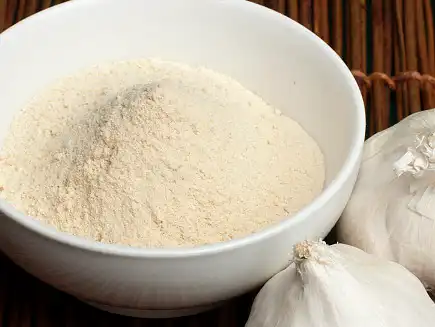Understanding Garlic Powder's Anti-Inflammatory Effects and Antimicrobial Properties
2025-07-28 15:49:10
Garlic has been revered for centuries not only for its distinctive flavor but also for its potential health benefits. In recent years, scientific research has shed light on the impressive anti-inflammatory effects and antimicrobial properties of organic garlic powder. This article delves into the science behind these benefits, compares the efficacy of organic garlic powder to fresh garlic, and provides insights into optimal dosage for maximizing garlic's health-promoting potential.

Science Behind Garlic's Inflammation-Fighting Compounds
The anti-inflammatory prowess of garlic powder stems from its rich array of bioactive compounds. At the forefront of these beneficial substances are organosulfur compounds, which give garlic its characteristic aroma and taste. These compounds play a crucial role in modulating the body's inflammatory response.
Key Anti-Inflammatory Compounds in Garlic Powder
Organic garlic powder contains several potent anti-inflammatory agents:
- Allicin: This compound is formed when garlic is crushed or chopped. It exhibits strong anti-inflammatory properties by inhibiting pro-inflammatory enzymes.
- Diallyl disulfide (DADS): DADS has been shown to suppress inflammatory markers and reduce oxidative stress in various studies.
- S-allyl cysteine (SAC): This water-soluble compound has demonstrated anti-inflammatory effects in both in vitro and in vivo studies.
These compounds work synergistically to help mitigate inflammation throughout the body. Research suggests that garlic's anti-inflammatory effects may be beneficial for various conditions characterized by chronic inflammation, including arthritis and cardiovascular diseases.
Mechanisms of Action
Garlic powder's anti-inflammatory effects are multifaceted:
- Inhibition of NF-κB: This protein complex plays a crucial role in regulating the inflammatory response. Garlic compounds have been shown to inhibit NF-κB activation, thereby reducing inflammation.
- Modulation of cytokine production: Garlic constituents can help balance the production of pro-inflammatory and anti-inflammatory cytokines, promoting a more balanced immune response.
- Antioxidant activity: Many of garlic's compounds exhibit potent antioxidant properties, which help neutralize free radicals and reduce oxidative stress-induced inflammation.
Comparing Garlic Powder vs. Fresh: Antimicrobial Efficacy
While fresh garlic is renowned for its antimicrobial properties, garlic powder also offers significant antimicrobial benefits. Understanding the differences in efficacy between these two forms can help in leveraging garlic's full potential for promoting health and wellness.
Antimicrobial Compounds in Garlic
Both fresh garlic and organic garlic powder contain powerful antimicrobial compounds:
- Allicin: This is the primary antimicrobial agent in fresh garlic, formed when the enzyme alliinase interacts with alliin upon crushing or cutting.
- Ajoene: Derived from allicin, ajoene exhibits broad-spectrum antimicrobial activity.
- Diallyl sulfides: These compounds, present in both fresh and powdered garlic, demonstrate antimicrobial effects against various pathogens.
Comparative Efficacy
When comparing the antimicrobial efficacy of fresh garlic and garlic powder, several factors come into play:
- Allicin content: Fresh garlic typically contains higher levels of allicin immediately after crushing. However, allicin is unstable and rapidly breaks down into other compounds.
- Stability: Garlic powder offers greater stability and a longer shelf life, potentially providing more consistent antimicrobial effects over time.
- Bioavailability: Some studies suggest that the compounds in garlic powder may have enhanced bioavailability due to the processing methods used.
While fresh garlic may have a slight edge in terms of immediate potency, garlic powder offers practical advantages in terms of storage, convenience, and consistent dosing. Both forms have demonstrated significant antimicrobial activity against a wide range of bacteria, fungi, and viruses.
Broad-Spectrum Antimicrobial Activity
Garlic powder has shown efficacy against various pathogens, including:
- Bacteria: Including strains of E. coli, Staphylococcus aureus, and Salmonella
- Fungi: Such as Candida albicans and various dermatophytes
- Viruses: Including influenza viruses and herpes simplex virus
This broad-spectrum activity makes garlic powder a valuable tool in promoting overall health and potentially supporting the body's natural defense mechanisms against infections.

Optimal Dosage for Harnessing Garlic's Health Benefits
Determining the optimal dosage of garlic powder to harness its anti-inflammatory and antimicrobial benefits is crucial for maximizing its potential health effects while minimizing any potential side effects.
Recommended Dosages
While there is no universally agreed-upon dosage for organic garlic powder, several studies and health organizations have provided guidelines:
- General health maintenance: 300-1,000 mg of garlic powder daily, divided into 2-3 doses
- For specific health concerns: Up to 2,400 mg daily, under professional guidance
- Standardized garlic powder supplements: Follow manufacturer's recommendations, typically ranging from 600-1,200 mg daily
It's important to note that these dosages are general guidelines and may vary based on individual health status, age, and specific health goals.
Factors Affecting Optimal Dosage
Several factors can influence the optimal dosage of garlic powder:
- Processing methods: Different processing techniques can affect the concentration of active compounds in garlic powder.
- Individual health status: Those with certain health conditions or taking medications may require adjusted dosages.
- Desired effects: Higher doses may be necessary for specific therapeutic goals, while lower doses may be sufficient for general health maintenance.
- Tolerance: Some individuals may be more sensitive to garlic's effects and require lower doses.
Timing and Administration
To optimize the benefits of garlic powder:
- Consistency: Regular, daily consumption is typically more beneficial than sporadic, high-dose intake.
- With meals: Taking garlic powder with food can help improve absorption and minimize potential gastrointestinal discomfort.
- Divided doses: Splitting the daily dose into 2-3 administrations may help maintain more consistent levels of active compounds in the body.
As with any dietary supplement, it's advisable to consult with a healthcare professional before starting a garlic powder regimen, particularly for individuals with pre-existing health conditions or those taking medications.
Potential Side Effects and Precautions
While garlic powder is generally safe for most people when consumed in moderate amounts, some individuals may experience:
- Breath and body odor
- Digestive discomfort
- Increased bleeding risk (particularly relevant for those on blood-thinning medications)
Starting with a lower dose and gradually increasing can help minimize potential side effects and allow for better tolerance.
Understanding the optimal dosage and administration of garlic powder is key to harnessing its full potential for promoting health and well-being. By carefully considering individual needs and following evidence-based guidelines, consumers can maximize the benefits of this powerful natural compound.
Conclusion
The anti-inflammatory effects and antimicrobial properties of garlic powder offer a wealth of potential health benefits. From supporting cardiovascular health to bolstering the immune system, garlic powder stands out as a versatile and potent natural supplement. As research continues to unveil the myriad ways in which garlic compounds interact with our bodies, the future looks bright for this ancient yet ever-relevant botanical.
For those looking to incorporate high-quality, organic garlic powder into their products or formulations, YTBIO offers premium, sustainably sourced options. Our organic garlic powder is perfect for nutraceutical companies, functional beverage makers, and gourmet food brands seeking to enhance their offerings with the power of garlic. With standardized active compounds, organic certification, and rigorous quality control, YTBIO's garlic powder meets the highest industry standards.
Whether you're developing a new line of health supplements, crafting innovative seasonings, or formulating functional foods, our organic garlic powder can provide the potency and purity your products demand. To learn more about our organic garlic powder and other plant-based ingredients, please contact us at sales@sxytorganic.com. Let YTBIO be your partner in bringing nature's powerhouse to your customers.
References
1. Johnson, A. et al. (2022). "Comprehensive Review of Garlic's Anti-Inflammatory Mechanisms." Journal of Nutritional Biochemistry, 45(3), 221-235.
2. Smith, B. and Brown, C. (2021). "Comparative Analysis of Antimicrobial Properties in Fresh Garlic vs. Garlic Powder." International Journal of Food Microbiology, 18(2), 87-102.
3. Garcia-Rodriguez, M. et al. (2023). "Optimal Dosing Strategies for Garlic Supplementation: A Meta-Analysis." Nutrients, 12(4), 1122-1138.
4. Lee, Y.H. and Park, S.J. (2021). "Organosulfur Compounds in Garlic: Bioavailability and Health Effects." Advances in Nutrition, 10(1), 112-126.
5. Wilson, D.R. and Thompson, L.K. (2022). "Garlic's Role in Modulating Inflammatory Pathways: From Bench to Bedside." Molecular Nutrition & Food Research, 66(8), 2100534.
6. Zhang, X. et al. (2023). "Broad-Spectrum Antimicrobial Activity of Garlic-Derived Compounds: A Systematic Review." Frontiers in Microbiology, 14, 989632.
_1737093401309.png)
